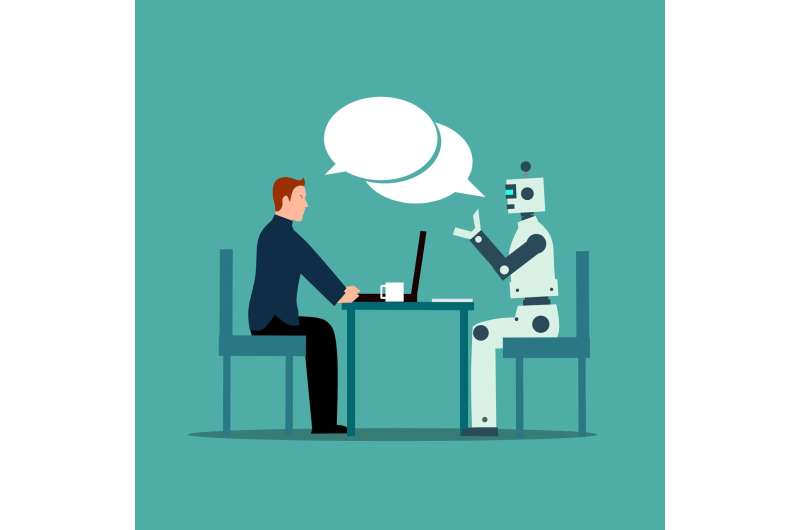AI in HR: Are you cool with being recruited by a robot? Studies reveal job candidates' true feelings

Artificial intelligence (AI) is transforming the human resource management (HRM) industry faster than we notice. of organizations are already using AI-enabled tools in the hiring process, but only a third of job candidates are aware of the practice.
Pros and cons of AI in recruitment
In recruitment, AI-enabled tools have the ability to collect large amounts of organizational data to search, identify, evaluate, rank, and select job candidates. They can across teams, generate advertisements with model candidate traits, and highlight potential candidates from a range of digital platforms.
AI-enabled tools have long promised efficiency in the processing of applicants' documents while potentially reducing the bias from HR agents who might, intentionally or not, discriminate or unjustly judge some applications.
However, emerging evidence suggests that AI-enabled HR tools may discriminate certain candidates who may not fit the historical pattern for the job description, such as candidates who are (in STEM) or those with due to illness, disabilities, caring for a family member, unemployment, or .
Those of us who worry about the use of AI in HR won't be reassured by its track record in other fields. Tech giants including Apple, IBM, and Microsoft—all of whom presumably know what they're doing—have faced scrutiny for ethical failures, especially with regards to gender discrimination. For example, US regulators after its AI-powered credit-card service was revealed to be systematically offering women lower credit limits. The alarm was raised by several couples, including Steve Wozniak himself, co-founder of Apple, and his wife, for whom the credit-card algorithm was offering the man a higher credit limit, even though the couple had joint accounts.
Perceptions matter
Available data on AI in recruitment suggests that job seekers are instinctively critical of its use. Candidates subjected to autonomous AI decisions describe the process as or
Other research suggests that judgment is less harsh in different contexts. According to a by Tideo, only 31% of respondents would agree to allow AI to decide whether or not they get hired. But that figure rises to 75% if there's also a human presence involved in the process. Still, 25% of participants believe that any use of artificial intelligence in recruitment is unfair.
Prior to our research, ethical perceptions of organizations using AI-enabled tools in the hiring process hadn't been studied much. Most scholarly research on the topic focused on the or —for example, chatbots—rather than trust in the organizations themselves.
In two publications in the , we looked at how the use of AI in hiring might impact job seekers' or recently hired individuals' trust in the company. We found that their perceptions of AI determine whether they identify the organization using it as trustworthy or even attractive and innovative.
Perceptions vary depending on individuals' personal values, past experiences, and technology acceptance. They also vary across contexts and applications. For instance, whereas an individual might trust the effectiveness of AI to predict movie preferences, studies show that most would still or a human-AI collaboration (i.e., versus autonomous AI) to make a hiring determination.
Ethics are attractive
In a on AI ethics and organizational trust, we found that candidates who perceive AI in the hiring process as highly effective, from a performance standpoint, are 64% more likely to trust the organizations that use it.
We followed up with a on a related subject. We found that the higher an individual's ethical perceptions of using AI in hiring, the more attractive he or she finds the organization. For instance, candidates who perceive that it is ethical for an organization to use AI to analyze their personal social media content or analyze an audio interview for voice cues are 25% more likely to perceive that organization as attractive.
Human-AI balance is key
Human-resources managers face an increasingly complex ethical environment, where AI involves a fast-growing set of applications. Organizations that are determined to keep the "human" in HR will need to carefully balance both in the hiring process, while taking consideration factors such as transparency and financial expectations.
Along with other studies, our research brings new urgency to the task of integrating AI ethics into the of every organization.
Journal information: Journal of Business Ethics
Provided by The Conversation
This article is republished from under a Creative Commons license. Read the .![]()




















